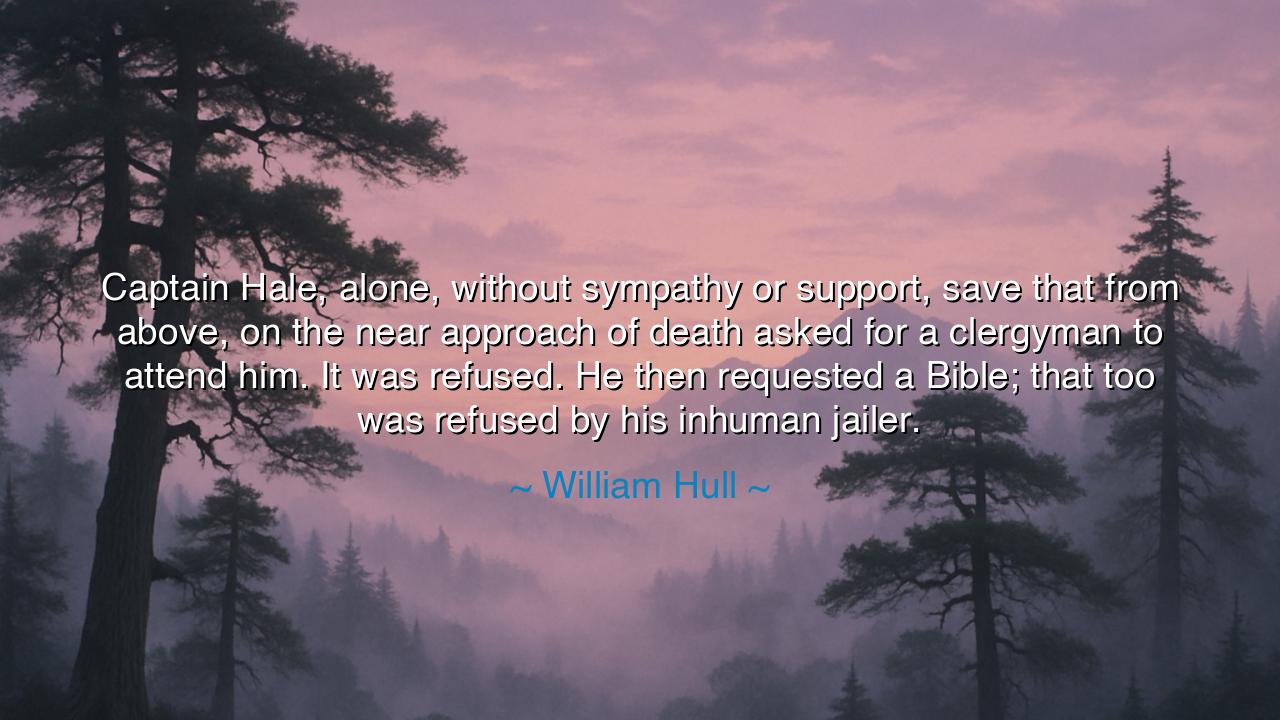
Captain Hale, alone, without sympathy or support, save that from
Captain Hale, alone, without sympathy or support, save that from above, on the near approach of death asked for a clergyman to attend him. It was refused. He then requested a Bible; that too was refused by his inhuman jailer.






When William Hull recorded the fate of Captain Nathan Hale, saying, “Captain Hale, alone, without sympathy or support, save that from above, on the near approach of death asked for a clergyman to attend him. It was refused. He then requested a Bible; that too was refused by his inhuman jailer,” he preserved for us not only a moment of suffering, but also a testimony of dignity, faith, and sacrifice. These words ring through the ages as a lament of cruelty and a hymn of courage. They remind us of the price of liberty, and of the immortal strength that a man may show when stripped of every comfort and abandoned to the shadows of death.
Hale was but a youth of twenty-one, a soldier in the American Revolution, who took upon himself the dangerous role of spy in the service of his country. Captured by the British, he was condemned to die by the hangman’s noose. In those final hours, stripped of friends, stripped of earthly compassion, he turned not to weapons, not to vengeance, but to the eternal: he sought a clergyman, he sought a Bible—a last touch of the divine to steady his heart as he passed from life to death. Yet even these were denied to him by his captors, a cruelty that could have broken the spirit of a lesser man.
And yet, Hale’s story did not end in despair. For though men denied him comfort, heaven did not. In the silence of his prison, his courage did not falter. In his last breath, he uttered the words that made him immortal: “I only regret that I have but one life to lose for my country.” This, then, is the true meaning of Hull’s account: that even when every earthly aid is stripped away, when even a Bible is withheld, a man’s faith and honor may still shine brighter than any flame.
The ancients too told of such deaths. Consider Socrates, condemned by Athens to drink the hemlock. He asked for no favor, no mercy, but accepted his fate with serenity, speaking of the immortality of the soul and the justice of truth. He too was denied the comfort of earthly reprieve, yet he turned to something higher, leaving behind not despair, but example. In the lives of Hale and Socrates alike, we see that when cruelty closes every door, the door to the spirit remains open.
The lesson is this: men may deny you comfort, they may strip you of dignity, they may even take your life—but they cannot touch the soul that stands firm in truth. Hale’s courage shows us that true strength is not measured in arms, wealth, or companions, but in the spirit’s resolve to face death without surrender. To be alone, “without sympathy or support,” is a trial few can endure, but it is in such moments that one’s true self is revealed.
What, then, should we learn for our own lives? First, cherish your faith and inner strength, for these are the weapons no jailer can disarm. Second, live with such integrity that, if the hour of trial comes, you may face it without shame. Third, honor those who came before us, like Hale, who endured suffering not for their own gain but for the cause of freedom, justice, and truth. For their sacrifice planted seeds of liberty that we now harvest.
And finally, let us remember that cruelty, though it wounds the flesh, cannot conquer the spirit. The jailer denied Hale a clergyman, he denied him a Bible, but he could not deny him his immortality. Hale’s body perished, but his words and his courage live on, teaching generation after generation that the highest triumph of man is not to escape death, but to meet it with faith, honor, and an unbroken soul.
Thus, as Hull wrote, let us look upon Hale not as a victim, but as a beacon. Though abandoned by men, he was upheld by heaven. Though refused earthly comfort, he walked into eternity with the courage of a hero. And so the teaching is clear: stand firm in your convictions, hold fast to your inner truth, and even in the darkest hour, your light will shine for ages to come.






AAdministratorAdministrator
Welcome, honored guests. Please leave a comment, we will respond soon